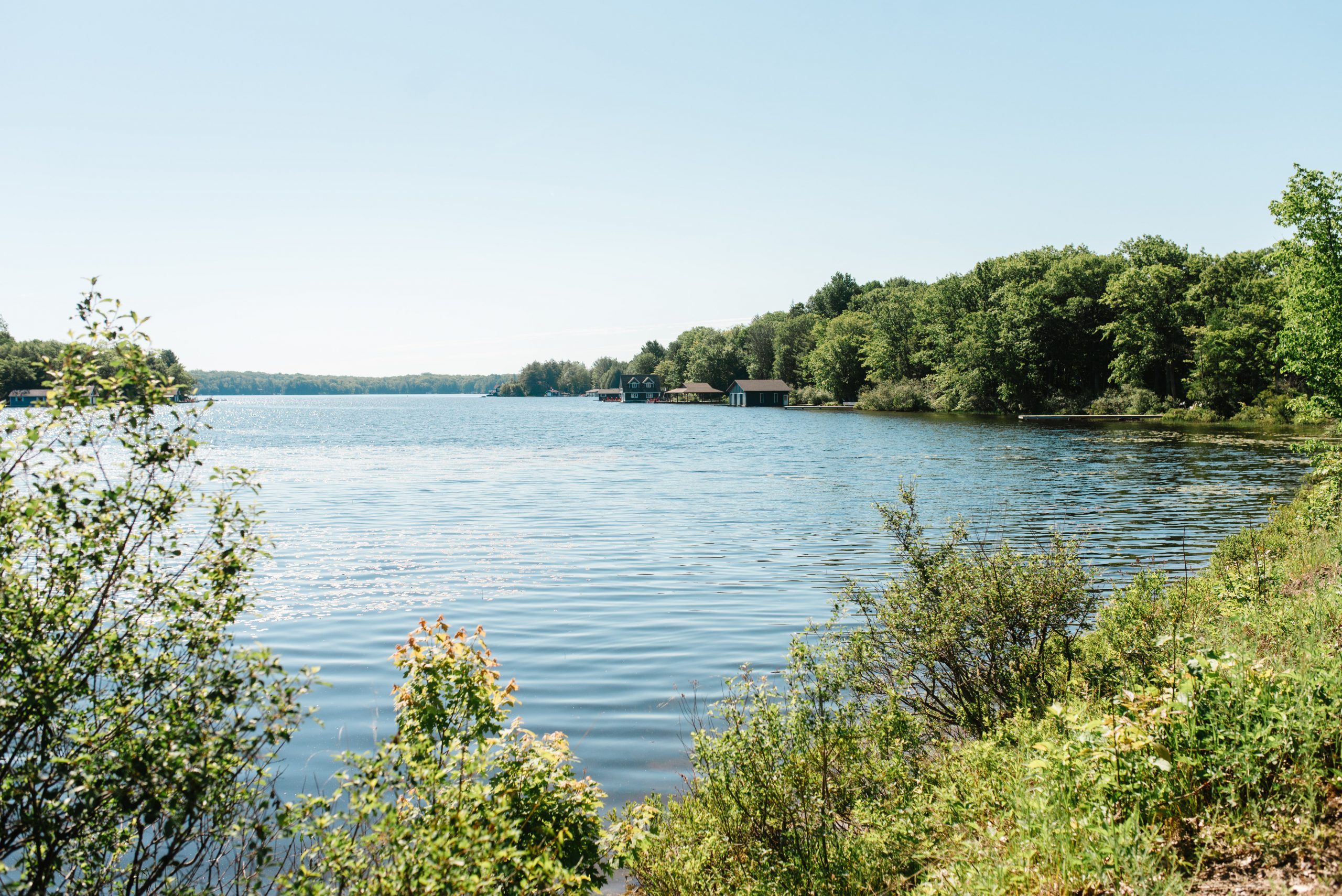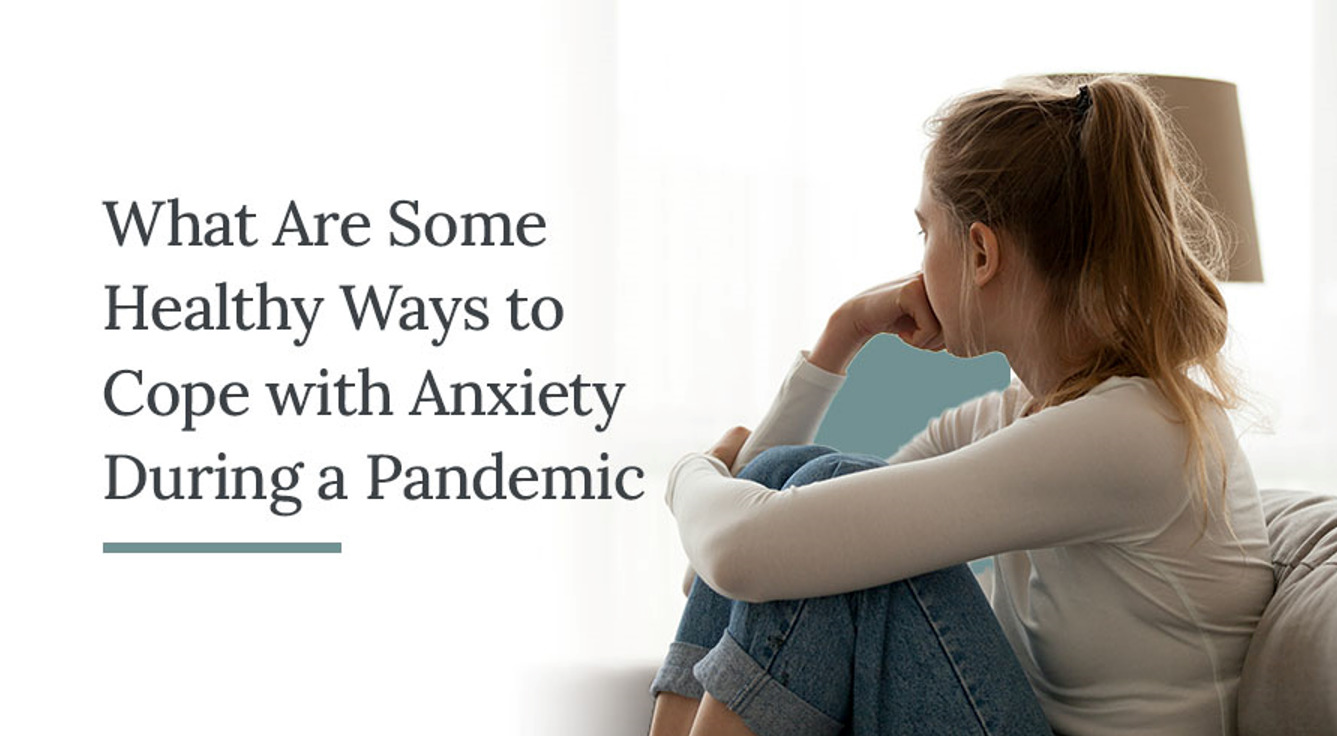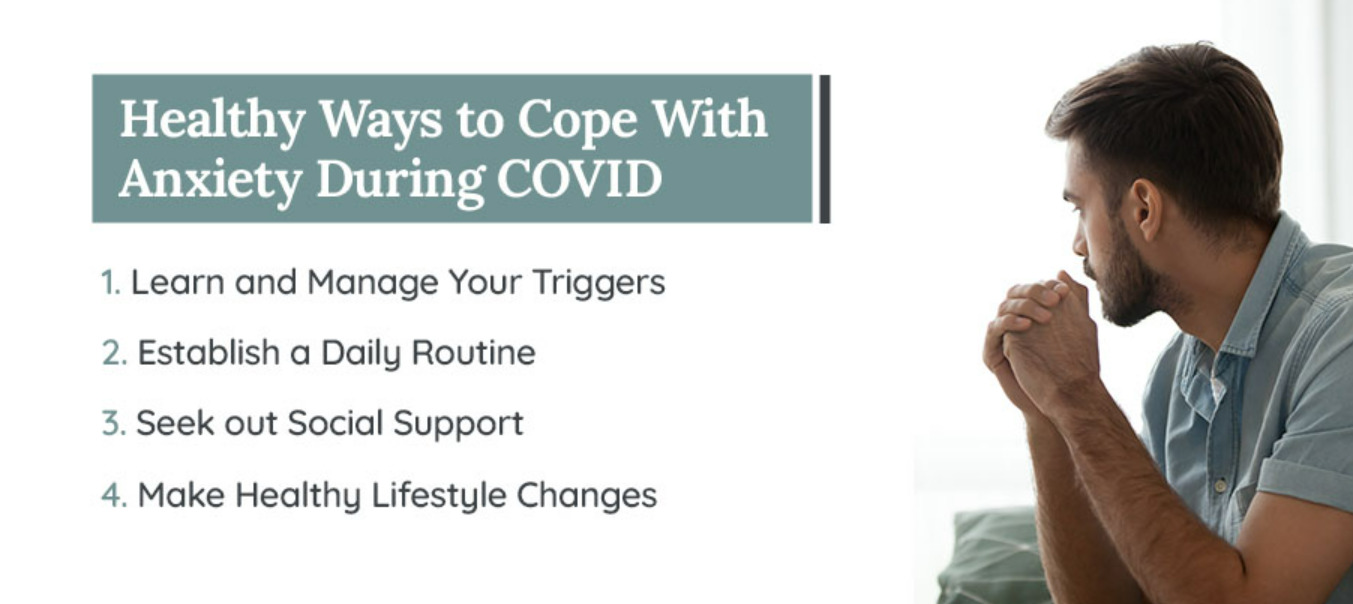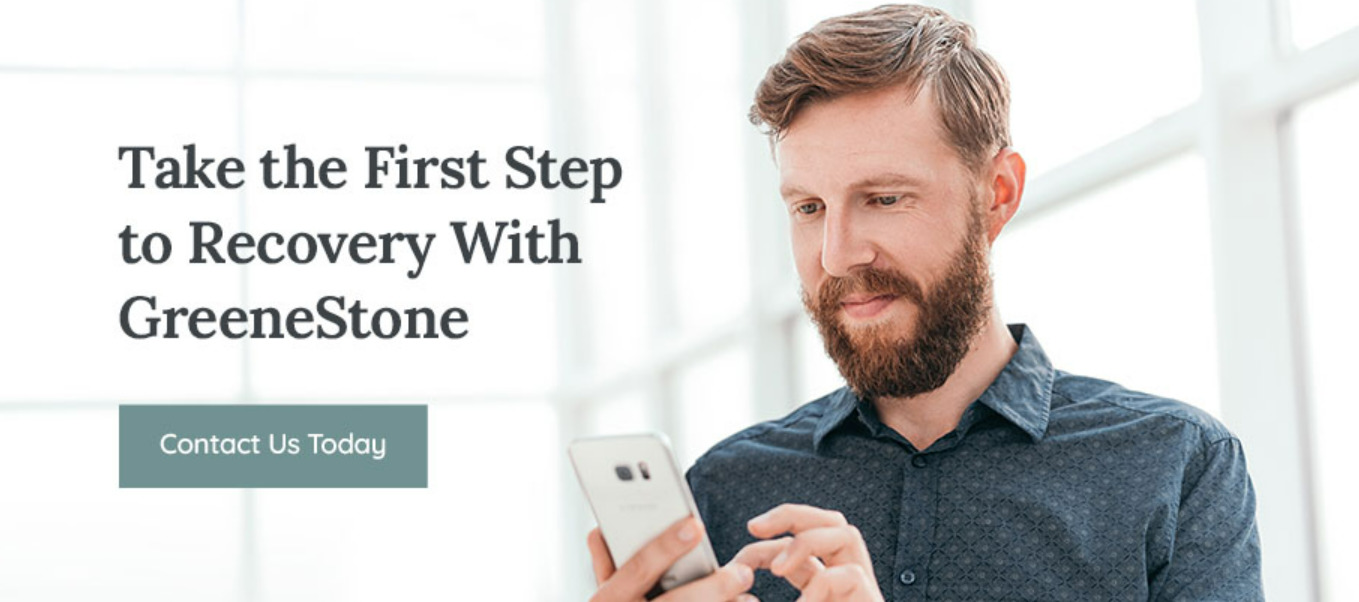Everyone has experienced anxiety to some degree. Whether it’s a teenager worried about an upcoming exam or an adult stressed about reaching an important work deadline, feelings of anxiety and stress are part of our daily life. However, there’s a difference between feeling stressed about particular events and struggling with an anxiety disorder.
Anxiety disorders are categorized as such because their degree ultimately ends up interfering with a person’s daily life. For example, a college student could experience excessive stress about an exam and end up pulling multiple all-nighters to study, despite having a good grasp of the material. Or, a person may experience frequent anxiety over issues such as arriving early for events or travelling.
Anxiety is a psychological, physiological and behavioral response that has helped humans and animals cope with difficult or unexpected situations and changes. But experiencing high levels of anxiety is not normal. The COVID-19 pandemic and the resulting lockdowns have led to increasing levels of anxiety and other mental health disorders. If you could use some help emotionally dealing with COVID-19, check out the following information and tips.
Anxiety Levels Rise During the Pandemic
Approximately 25% of Canadians experienced stress and anxiety during the pandemic. However, during the COVID-19 pandemic, levels of anxiety have grown. General feelings of fear and uncertainty about one’s own health, being stuck at home and the future are the root causes or triggers of many people’s COVID-related anxieties.
According to one study on mental health and COVID-19 that analyzed levels of stress, anxiety and depression in the general population, there are a few groups that experience heightened levels of anxiety due to the pandemic:
-
- Adults age 21-40: The study found younger to middle-aged people were more likely to experience heightened levels of anxiety due to the pandemic. Reasons for this anxiety range from exposure to negative news on social media to stressors about finances and job security, as well as future consequences of the pandemic.
- People with chronic illnesses: Because the COVID-19 virus proved especially harmful to those with weakened immune systems, people with chronic illnesses or a history of medical issues experienced more anxiety.
- People with phobias: Many anxiety disorders and phobias have health-related roots, and so the pandemic led to an increase in anxiety about health, germs and general sanitation.
- People with higher education levels: The study found that those with higher levels of education were more likely to be self-aware, and thus recognize how their symptoms of anxiety and depression manifested.
- Healthcare personnel: The pandemic placed an enormous amount of stress on the essential healthcare personnel on the front lines. Confronting the impacts of COVID-19, including frequent death and severe illness, working long hours in an extremely high-stress environment and risking their own health to help their patients contributed to the increased anxiety among healthcare workers.
In addition to health concerns related to the pandemic’s spread, many people suffered anxiety due to being stuck at home. With many workplaces shut down, workers faced financial hardships and anxieties, and many had to rely on government assistance to make ends meet. In April 2021, the unemployment rate stood at 8.1%. Food and financial insecurity also became more prevalent than ever, particularly in Black, Indigenous and Latino households.
Some people faced anxiety due to being stuck in an environment that was not healthy for them. Spending time at home kept the population safe, but researchers have connected the stay-at-home orders to an increase in cases of domestic violence. Students staying at home also experienced negative impacts on their educational preparedness and readiness.
Overall, the pandemic contributed to an understandable rise in levels of anxiety among people of all ages. In a time of incredible uncertainty and stress, many people discovered new or worsening symptoms of anxiety.
To cope with your anxiety in a healthy way — rather than resorting to temporary, unhealthy coping mechanisms — you can take specific steps to manage and reduce your anxiety triggers.
Healthy Ways to Cope With Anxiety During COVID
While anxiety is a difficult and sometimes even debilitating condition, there are many ways to take care of one’s mental health during coronavirus. The following are examples of healthy ways you can cope with your anxiety as a result of the pandemic.
1. Learn and Manage Your Triggers
In terms of psychology, a trigger is something that instigates feelings of anxiety. Some examples of common triggers include:
- Caffeine.
- Stress.
- Health issues.
- Relationship struggles.
- Social events.
- Finances.
- Public speaking.
- Deadlines.
- Interrupted sleep patterns.
- Body image.
People with a generalized anxiety disorder might experience anxiety from a variety of sources, including some of the above triggers. Some people experience anxiety from a specific type of event or situation. Most people, however, have certain triggers they can identify as primary or significant sources of their anxiety. Being able to identify your individual triggers is the first step in coping with your anxiety.
Ways to help you identify your triggers include keeping a journal, reflecting on your past experiences and talking with a trusted friend or mental health professional. The purpose of identifying your triggers isn’t always to completely avoid them — part of managing your anxiety is knowing how to cope when you do confront one of your triggers.
If caffeine increases your anxiety, you can easily avoid caffeinated beverages. However, if you need to make a presentation for work or school, skipping that day to avoid your public speaking anxiety may not be possible. Learning what methods work best for you to deal with your anxiety triggers will prevent them from limiting your experiences and enjoyment of life.
Working on your self-awareness can help you identify specific thought patterns that often lead or exacerbate your anxiety. Ask yourself questions like:
- What can I control?
- Who might be able to help me?
- Am I safe?
- What are steps I can take to feel better?
- How have I dealt with this situation before?
- How can I focus on the positives?
Often, the best thing you can do to calm your anxiety is to learn more about it. Recognizing the triggers of your anxiety and acknowledging your feelings are essential — the next steps involve practicing habits that reduce the power of your triggers and give you tools to overcome them.
Learn More About Our Mental Health Support Program
2. Establish a Daily Routine
Since anxiety often manifests from uncertainty, having a daily routine can help you cope, especially during the pandemic. Feeling like you have no control is scary, but a routine can help you feel a sense of mastery over your life and environment. Waking up and going to bed at the same time each day is the first and most important step you can take — this step offers consistency, and it often helps support healthy sleep patterns.
Starting each day with a healthy breakfast and morning routine can set you up for a productive day. Even if you’re stuck at home, making your bed can help you feel accomplished and organized. Morning showers can also help you wake up and feel more refreshed, which is especially helpful if you try to avoid caffeine.
As part of your daily routine, set out self-care activities you can do for yourself each day or throughout each week. Some great self-care ideas to add to your daily routine include:
- Meditation: Suggesting someone with anxiety practices meditation might seem cliché at this point, but it really is an effective way to manage anxiety. By sitting quietly and attempting to clear your mind, you can gain great coping skills when your anxiety triggers make your thoughts race.
- Grooming routine: No matter who you are, taking care of your skin and hair is an important element of proper hygiene, but it can also help you demonstrate care for your body.
- Journaling: Writing down your thoughts and feelings is an effective strategy to identify and manage anxiety. Reflecting on your past entries can help you pinpoint negative thought patterns and develop strategies to overcome them.
- Hobbies: Taking time each day to do something you love — and keeping that time sacred — can help you stick to your routine. If you work all day, do one of your favorite activities, whether that’s video games or knitting, when you get home to switch your mind off work.
- Naps: The trick to making naps an effective part of your daily routine and self-care is timing them effectively. Research states that 10 to 20 minute-long naps are ideal for refreshing your energy without leaving you groggy. However, excessive napping can result in difficulty falling and staying asleep. If you are suffering from insomnia, you will want to avoid naps.
- Cooking: While a lot of people lead busy lives, there are many benefits to setting aside time each day to prepare a meal for yourself. Whether you live alone or have a couple of kids you need to feed, taking time to cook can help you feel more accomplished and stimulated.
3. Seek out Social Support
During a pandemic, it’s important to stay connected to those you love. Technology enables people to communicate instantly even across continents, so it’s a wonderful tool for maintaining relationships. Spending time with people is another healthy coping mechanism if you suffer from anxiety as it can help direct your energy outward rather than internally, which can contribute to anxiety.
Socialization can increase hormone levels that decrease anxiety and help build structures of support that help carry you through rough times. As humans, we’ve relied on social structures to support our survival from the beginning. While advancements in technology and agricultural practices mean our survival relies less on social cooperation, social support is still integral to our health and well-being.
If you suffer from anxiety, seeking out social support from friends and loved ones can be a great coping mechanism to help work through your anxiety. Talking through your triggers is a great practice to help deal with or overcome them, and doing so with a trusted friend or family member can ensure continued support.
Another way to rely on social support is to seek out professional help. There are people trained to help you work through your anxiety and can give you tools to manage your stress. If you are experiencing extreme anxiety or stress and need immediate help, some important resources include:
- Crisis Services Canada — call 1-833-456-4566 or chat with a support specialist online.
- Crisis Text Line — text or message with a crisis counselor to address your anxiety or panic attacks.
- If you feel like you or someone you know is in immediate danger, contact 911 or go to your nearest emergency medical center.
4. Make Healthy Lifestyle Changes
In addition to establishing a routine and seeking out support from friends, family and professionals, you can also make some simple lifestyle changes to reduce your levels of anxiety. Lifestyle changes you can make to better cope with your anxiety include:
- Staying active: Keeping a regular exercise routine is scientifically proven to reduce anxiety. Physical activity can reduce muscle tension and increase your ability to process serotonin, the happy chemical in your brain. Furthermore, participating in group exercise activities can build social relationships and foster other sources of emotional support.
- Eating healthy: Fueling your body with essential vitamins and nutrients from healthy foods is a great way to reduce anxiety.
- Avoiding alcohol and drugs: Using substances such as alcohol and drugs has been proven to increase levels of anxiety. Studies show co-occurrences between anxiety disorders and substance use disorders is especially high, and it requires a specialized treatment plan.
- Prioritizing sleep: An integral element of coping with anxiety is getting your recommended amount of sleep every night. Teenagers should get at least eight to 10 hours each night, and adults need seven or more hours.
Take the First Step to Recovery With GreeneStone
Understanding how the COVID-19 pandemic has affected people with anxiety is essential. Many people with anxiety saw new or worsening triggers, and some people may have even developed an anxiety disorder as a result of their experiences during the pandemic. It is very easy to develop habits and behaviors to deal with our anxiety that aren’t helpful or productive. Many people who struggle with mental health disorders resort to alcohol and drugs to seek relief from their symptoms.
GreeneStone Centre for Recovery has a wide range of treatment programs that can help people with co-occurring disorders, including anxiety and substance use disorders. If you or someone you love is struggling and needs help, GreeneStone will create an individualized treatment program that includes:
- Diagnosis.
- Psychosocial history.
- Evaluation of any co-occurring mental health conditions.
- Physical health issues.
- A withdrawal risk assessment.
Every person’s journey through addiction is unique and deserves a comprehensive approach. At GreeneStone Centre for Recovery, we pride ourselves on our holistic approach to addiction treatment. To take the first step in your journey to recovery, contact us today.






